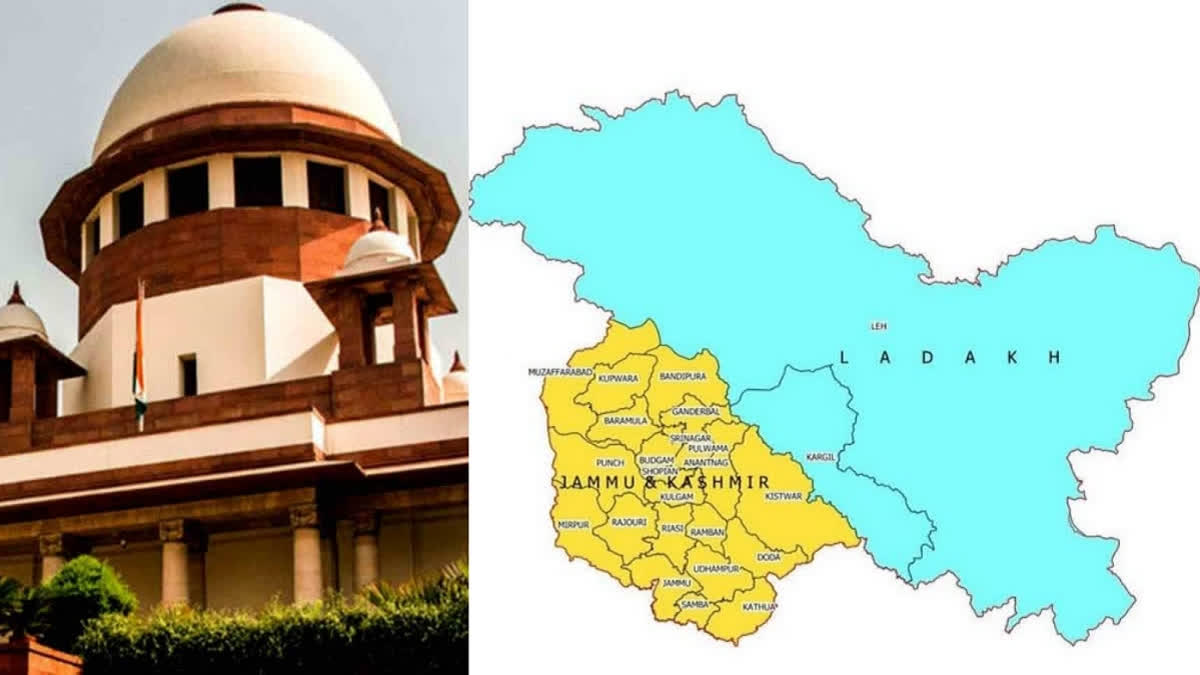New Delhi: The Supreme Court on Wednesday asked whether Parliament could have enacted the Jammu and Kashmir Reorganisation Act during the subsistence of the President's Rule in the erstwhile state of Jammu and Kashmir in 2018-2019.
A five-judge constitution bench headed by Chief Justice of India D Y Chandrachud and comprising justices S K Kaul, Sanjiv Khanna, B R Gavai, and Surya Kant, is hearing a batch of petitions challenging the abrogation of Article 370, which bestowed special status on the erstwhile state of Jammu and Kashmir. The Jammu and Kashmir Reorganisation Act divided the state into two union territories.
Senior advocate Rajeev Dhavan, appearing for Jammu and Kashmir People’s Conference, one of the petitioners’, contended before the court that the internal sovereignty of Jammu and Kashmir was not revoked with the signing of the Instrument of Accession in 1947, and it was only external sovereignty which was lost. Dhavan submitted that the President does not exercise ‘carte blanche’ powers when the President’s Rule is in operation under Article 356 of the Constitution. Dhavan insisted that restrictions must be imposed to curb its misuse. Dhavan’s client has also contested the imposition of the President’s Rule in the erstwhile state on December 19, 2018, and its extension on July 3, 2019, for six months.
The top court queried Dhavan, can Parliament enact a law (Jammu and Kashmir Reorganisation Act) during the subsistence of a proclamation under Article 356 in the exercise of its power? Dhavan replied that there is a mandatory condition under Articles 3 and 4 of the Constitution dealing with the formation of new states and alteration of boundaries or names of existing state -- the president has to refer the matter to the state legislature.
Senior advocate Dushyant Dave, representing one of the petitioners, contended that Article 370 is a ‘temporary provision’ not due to the efflux of time but because it has served its object and purpose, therefore it cannot be amended anymore. Dave said Article 370 is perhaps the most brilliant articulation of statesmanship on the part of those who framed the Constitution. Dave pointed out that the current dispensation’s manifesto in 2019 had stated that Article 370 will be abrogated and stressed that constitutional powers cannot be exercised to achieve political ends. Dave said the abrogation of Article 370 strikes at the very basic feature of our Constitution: democracy and federalism. In the context of insurgency, Dave said giving this kind of power to a majoritarian government would be the destruction of rule of law.
The hearing in the matter will continue tomorrow. The Jammu and Kashmir Reorganisation Bill was tabled and passed by the Rajya Sabha on August 5, 2019 and was tabled and passed by the Lok Sabha the next day. The Bill received presidential assent on August 9, 2019.



